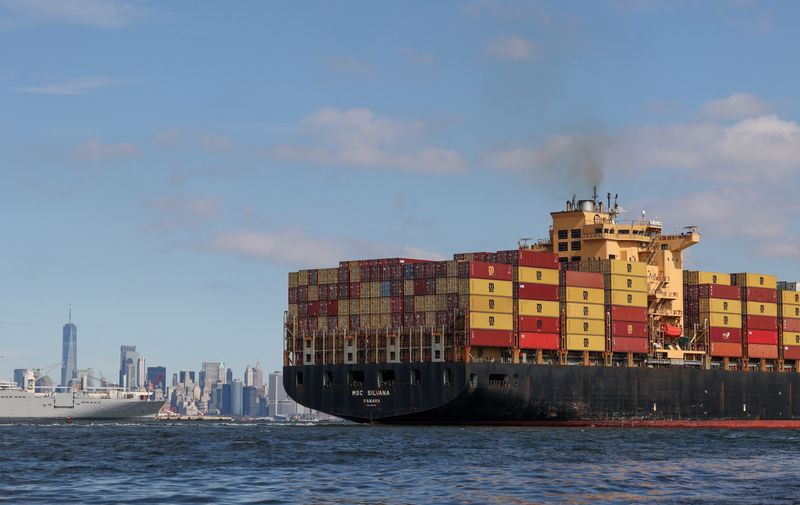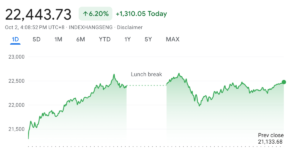US East Coast port strike looms Tuesday with no talks scheduled

By David Shepardson, Doyinsola Oladipo and Lisa Baertlein
(Reuters) -U.S. East and Gulf Coast port workers are set to go on strike in less than 10 hours with no talks currently scheduled to head off a stoppage threatening to halt container traffic from Maine to Texas and cost the economy billions per day.
The labor contract between the International Longshoremen’s Association (ILA) union representing 45,000 port workers and the United States Maritime Alliance (USMX) employer group expires late Monday, with negotiations at an impasse over pay.
“All signs are that there will be a strike,” said Rick Cotton, executive director of the Port Authority of New York and New Jersey at a press conference on Monday.
He said the gates of the marine terminals will close at 5 p.m. ET (2100 GMT) and nearly 100,000 containers will remain stored at the port until the strike is ended. Another 35 ships are expected to arrive at the port over the next week and they will remain at anchor during the strike.
U.S. Chamber of Commerce President Suzanne Clark urged President Joe Biden to use his authority to prevent a walkout for 80 days saying it “would be unconscionable to allow a contract dispute to inflict such a shock to our economy.” Biden said on Sunday he did not plan to intervene.
A port strike will go ahead starting Tuesday at 12:01 a.m. ET, the ILA said on Sunday. ILA said Monday the USMX “seems intent on causing a strike at all ports from Maine to Texas” because they have offered “an unacceptable wage package that we reject.”
USMX did not immediately comment.
If union members do walk off the job, it would be the first coast-wide ILA strike since 1977, affecting ports that handle about half of the nation’s ocean shipping.
No negotiations are taking place and none are planned before the Monday deadline, a person familiar with the matter said.
The union has previously said the strike would not impact military cargo shipments or cruise ship traffic.
But a strike could stop the flow of everything from food to automobiles at major ports, potentially jeopardizing jobs and stoking inflation weeks ahead of the U.S. presidential election.
New York Governor Kathy Hochul said the strike could impact things like automobile imports but said the state should not see any immediate impact on food suppliers or essential goods.
“We’re deeply concerned about the impact a strike could have on our supply chains, especially when it comes to critical goods like medical supplies and others,” Hochul said.
National Association of Manufacturers CEO Jay Timmons said a strike would throw manufacturing supply chains throughout the U.S. into disarray. “Billions of dollars of goods – from food to vehicles to electronics – rely on access to the East and Gulf Coast ports,” Timmons said.
A short strike could have a limited economic impact given many companies have imported extra goods ahead of a possible work stoppage or shifted more shipments to West Coast ports. But a strike that continues for weeks could have serious economic impacts.
“These people today don’t know what a strike is,” Harold Daggett, the ILA’s fiery leader, said in a recent video post. “I’ll cripple you. I will cripple you.”
For months, Daggett has threatened to shut down the 36 ports covered by his union if employers like container ship operator Maersk and its APM Terminals North America do not deliver significant wage increases and stop terminal automation projects.
The dispute is worrying businesses that rely on ocean shipping to export their wares, or secure crucial imports.
Steve Hughes, CEO of HCS International, which specializes in automotive sourcing and shipping, accused the ILA of “holding the entire country over a barrel.”
HIGH STAKES
An ILA strike could wedge labor-friendly President Joe Biden into a no-win position as Vice President Kamala Harris runs a razor-tight election race against former President Donald Trump.
U.S. presidents can intervene in labor disputes that threaten national security or safety by imposing an 80-day cooling-off period under the federal Taft-Hartley Act, forcing workers back on the job while negotiations continue.
On Friday, Biden administration officials met with the USMX employer group to directly convey “that they need to be at the table and negotiating in good faith fairly and quickly” – a message it had delivered earlier to the ILA.
The USMX has accused the ILA of refusing to negotiate.
Retailers that account for about half of all container shipping volume, and are headed into their all-important winter holiday sales season, have been busily employing backup plans.
“There is potential for another violent move across consumer stocks next week if – as is consensus thinking – the East Coast Longshoremen do indeed strike,” Jefferies analysts said in a client note.
Many of the big retail players rushed in Halloween and Christmas merchandise early to avoid any strike-related disruptions – incurring extra shipping and storage costs.
Retail behemoth Walmart (NYSE:), the largest U.S. container shipper, and membership warehouse club operator Costco (NASDAQ:) say they are doing everything they can to mitigate any impact.
But a lot of shippers do not have that flexibility as they are small, do most of their business on the East and Gulf Coasts or lack the financial might to load up on safety stock.

Ash Bhardwaj, CEO of Onx Homes, has factories in Florida and imports materials used to build homes in the company’s planned communities through the Port of Miami.
Like other shippers in his position, he was resigned to his fate. “Everyone will have the same problem,” Bhardwaj said.








